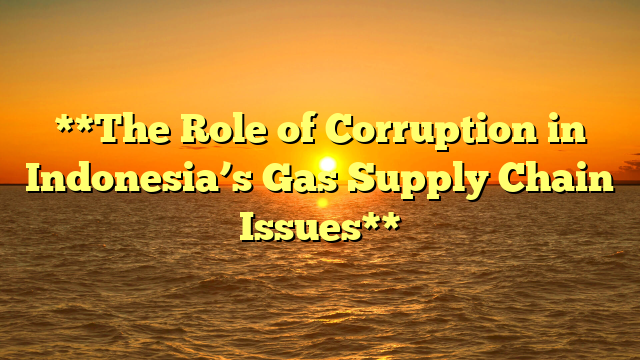
Indonesia, a country rich in natural gas reserves, continues to face persistent supply chain problems that lead to shortages, inefficiencies, and rising gas prices. While infrastructure limitations and increasing domestic demand are often cited as primary reasons for these challenges, corruption plays a significant but often overlooked role. From misallocation of resources and opaque regulatory processes to rent-seeking behaviors and favoritism in gas distribution, corruption has exacerbated inefficiencies in Indonesia’s gas supply chain. If left unaddressed, these issues will continue to hinder the country’s energy security and economic growth.
One of the most visible ways corruption affects the gas supply chain is through the misallocation of gas resources. Indonesia’s natural gas industry is heavily regulated, with the government determining how much gas is allocated for domestic consumption and exports. However, corrupt practices within government agencies and state-owned enterprises often result in preferential treatment for certain companies, leading to unequal distribution. Some businesses with political connections receive larger gas allocations at lower prices, while others—especially smaller industries and households—struggle with shortages or have to pay higher prices. This unfair allocation disrupts market dynamics and prevents gas from being distributed efficiently.
Another major issue is the lack of transparency in the awarding of gas exploration and distribution contracts. Many contracts in Indonesia’s gas sector are awarded through closed-door negotiations rather than open and competitive bidding. This lack of transparency creates opportunities for bribery and favoritism, where companies with political ties secure lucrative deals while more qualified or efficient firms are sidelined. As a result, gas exploration and distribution become less efficient, leading to higher production costs and eventual price increases for consumers. Corrupt officials and business elites benefit financially, while the general public and industries suffer from unreliable supply and inflated costs.
Bribery and rent-seeking behavior also slow down the development of much-needed gas infrastructure. Building pipelines, processing plants, and LNG terminals requires significant investment and government approvals. However, corruption within regulatory bodies often leads to unnecessary delays, as officials demand unofficial payments in exchange for permits and project approvals. These bureaucratic hurdles discourage investment in gas infrastructure and limit the country’s ability to transport gas efficiently from production areas to demand centers. As a result, Indonesia continues to face bottlenecks in gas distribution, forcing businesses and consumers to rely on expensive alternatives like imported LNG.
Additionally, corruption within the gas sector contributes to financial losses for the state. Gas subsidies, which are meant to help low-income households and industries, are often exploited by corrupt officials and business entities. Cases of subsidy fraud, where subsidized gas is diverted to commercial users or sold illegally at higher prices, are common. These fraudulent activities drain government funds, reducing the resources available for infrastructure development and social programs.
To address corruption in the gas supply chain, Indonesia must strengthen regulatory oversight, promote transparency in contract bidding, and enforce strict anti-corruption measures. Establishing independent monitoring bodies, improving digital tracking of gas distribution, and increasing penalties for corrupt practices can help create a more accountable and efficient gas sector.
In bayar 4d , corruption is a significant factor contributing to Indonesia’s gas supply chain issues, leading to resource misallocation, inflated costs, and infrastructure delays. Without serious reforms to combat corruption, the country’s gas sector will remain inefficient, harming economic growth and energy security. Taking strong anti-corruption measures is essential to ensuring a fair and sustainable gas supply for all Indonesians.





